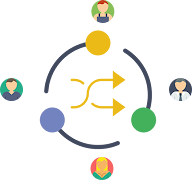What exactly DevOps means?
DevOps course is a set of practices, principles, and cultural philosophies that aim to bridge the gap between software development (Dev) and IT operations (Ops) within an organization. The term "DevOps" is a portmanteau of "Development" and "Operations," highlighting the core objective of fostering collaboration and communication between these traditionally separate functions. Here's a more detailed explanation of what DevOps means:
Collaboration: DevOps emphasizes breaking down silos and encouraging collaboration between development teams (those responsible for creating software) and operations teams (those responsible for deploying and managing the software in production). This collaboration is essential to align the goals and priorities of both teams.
Automation: Automation is a central tenet of DevOps. It involves automating manual and repetitive tasks throughout the software delivery pipeline, such as code integration, testing, deployment, and infrastructure provisioning. Automation helps reduce errors, increase efficiency, and accelerate the release of software.
Continuous Integration (CI): CI is a DevOps practice that involves frequently integrating code changes into a shared repository. Automated tests are run to detect and address integration issues early in the development process, ensuring that code is always in a working state.
Continuous Delivery (CD) and Continuous Deployment: CD and Continuous Deployment are practices that extend CI. Continuous Delivery involves automating the release process, making sure that code is always deployable but requires manual approval for deployment. Continuous Deployment goes a step further by automatically deploying code changes to production without manual intervention once they pass automated tests.
Infrastructure as Code (IaC): IaC treats infrastructure provisioning and management as code, allowing infrastructure to be defined and managed through code. This enables consistent, repeatable, and automated infrastructure deployment.
Monitoring and Feedback: DevOps promotes real-time monitoring of applications and infrastructure in production. Monitoring tools provide feedback on system performance, allowing teams to identify and address issues quickly. This feedback loop is crucial for continuous improvement.




Comments
Post a Comment